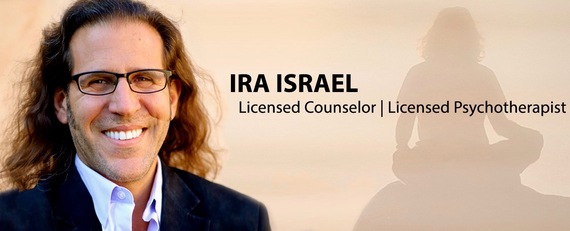"It is not true that money can't buy happiness. It can, that's the good news. The bad news is that it's someone else's happiness." ~ Nick Hornby
Spoiler alert: The last line, the summation of my new DVD Mindfulness for Depression is an ebullient "Happiness is a choice!" For those who have seen the DVD and agree with its critique of our fast-paced, over-stimulated, pressurized, stressful urban lives, I'd like to qualify that conclusion. Rather, if I were going to make the DVD again, I would end with "Happiness is a lifestyle choice!" Or possibly, "Happiness is a COMMITMENT to lifestyle choices!"
Growing up in the suburbs of New York in the 1970s and 1980s, my fellow students and I learned the typical ideals of "the American dream" and "the good life": Go to a good university, get a good (high-paying) job, buy a nice car, get married, buy a house, have children, send them to college, prepare for retirement. Many of my peers attained these goals but still were not happy.
Although I often find scientific means of measuring happiness analogous to trying to measure milk with a ruler, it is clear from the research of scholars such as Martin Seligman and Ed Diener that there are definitely factors and choices that contribute to overall happiness. For example, when one's income rises from survival mode of $5,000 to $50,000, happiness increases exponentially. Fear of imminent death -- something that a few billion fellow human beings experience on a daily basis -- is certainly a bummer. But if you're reading this blog -- even if you had to drag yourself down to the local library to do so -- you're living in relative abundance and should know that difference in degrees of happiness between people with incomes of $50,000 and $50,000,000 are not as great as you imagine they would be.
As it turns out, materialistic people are less happy than non-materialistic people. Perhaps the Buddha's second noble truth that "the root of all suffering is desiring, clinging, attachment" is beginning to ring true in the West after all? Or maybe Nietzsche put it more accurately when he wrote, "Those who possess little are that much less possessed." So if your sense of self or the meaning of your life is correlated to your bank accounts, stocks, house(s), possessions, or status symbols, then nobody will be surprised when your physician or psychiatrist hands you a script for Wellbutrin or Lexapro.
The only thing besides loving relationships that has a direct correlation to happiness is personal freedom. And yes, of course, freedom correlates to some extent with financial independence. One must have the means to make the choice between working a few more hours and going for a stroll with a friend or taking a yoga or painting class.
Additionally, one must want to choose things that bode propitiously for long-term happiness. Cocaine, for example, bodes exceptionally favorably for short-term happiness -- approximately 15-30 minutes of mirth and glee per snort; however, cocaine bodes exceptionally unfavorably for long-term happiness considering the eight to 12 hours of craving and misery one must weather following those initial 15 minutes -- plus the liver and heart damage. But how can we even think to make rational, intelligent long-term decisions when instant gratification is right under our noses? Particularly when we are living at hyperspeed and instant gratification still takes too long??
Again, this is why I strongly advocate mindfulness meditation to my patients: because it helps cultivate equanimity and non-reactivity so that we can make intelligent, rational long-term decisions. Most of our instantaneous reactions lean towards short-term -- often mind-numbing -- gratification. But when we have the space to reflect on the lives we wish to lead and have made a commitment to living healthy lifestyles, then rational choices between instant and delayed gratification are easy. And if you watch any of the delayed gratification experiments on YouTube, you'll quickly learn that children who were able to stave off their desires to pounce on a single marshmallow or cookie end up happier and more successful as adults.
When we are free to make intelligent choices it is clear that building community and healthy, authentic, loving relationships are the most important factors if we wish to be happy. The competitive nature of our brand of late capitalism foments relentless coveting that engenders insatiable jealousy; it foments suspiciousness and mistrust that engenders alienation and disconnectedness. Everyone is always looking for a bargain, trying to get the best "deal," trying to maximize profit and growth; thus, we all have to watch our backs.
The American zeitgeist is one of independence -- "Every man for himself!" "Go it alone!" "Survival of the fittest!" -- not interdependence. When someone explains the Eastern concept of Brahman -- that underneath everything we perceive through our five senses we are interconnected in a subliminal matrix -- most Westerners shrug it off as some sort of scientifically unprovable delusion. But maybe it's we who are delusional in believing that material possessions or status can bring happiness?
In Mindfulness for Depression I analyze our culture's definition of depression and propose a reframing of that dis-ease to empower people to make healthy, long-term choices. Because I am yet to hear a patient say, "I feel loved, respected, and appreciated by my family and friends, and I feel lovable and loving... AND I'M DEPRESSED."
So, for me, happiness is a lifestyle choice.